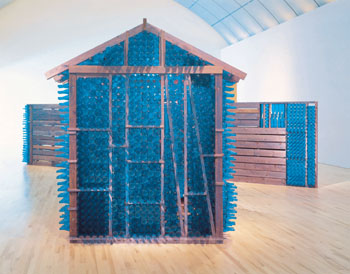![[Metroactive Arts]](/arts/gifs/art468.gif)
[ Arts Index | Silicon Valley | Metroactive Home | Archives ]

Bottle Up and Go: In her installation piece 'Abode: Sanctuary for the Familia(r),' Mildred Howard connects the generations with the materials of habitation. Houses of Memory Artists try to ravel up the threads of past lives in shows at SJ Museum of Art and SJSU By Michael S. Gant MILDRED HOWARD'S 1994 installation Abode: Sanctuary for the Familia(r) is literally a "house of the blues"—blue bottles, that is. The artist has filled in a ramshackle framework of wooden beams with thousands of dark-blue bottles, some bristling neck outward, others presenting their flat, round bottoms to the viewer. The piece, part of "Inside Out," the San Jose Museum of Art's new display of selections from its permanent collection, translates the vernacular architecture of handmade houses into a highly satisfying aesthetic experience. The bottles glint and shimmer under the spotlights mounted high in the vaulted ceiling of the upstairs gallery. The gaps between the bottles offer ever-shifting glimpses to—and through—the interior. Howard, who calls Berkeley home and is African American, also means for this bottle house to work as a time machine—a way of occupying the past by passing through the lens of memory. In the West and South, before prefab structures and trailer parks, settlers and slaves often salvaged discards and other found materials to build their idiosyncratic shelters. Abode: Sanctuary pays homage to their resourcefulness and connects the generations by an act of preservation. A few blocks away, at the Thompson Art Gallery at SJSU, the threads of memory are seriously frayed. In the show "Nunca Más/Never Again," several Argentinian artists wrestle with that country's disastrous "dirty war" of the late '70s and early '80s, when tens of thousands of citizens were labeled enemies of the state and "disappeared" by the military government. This brutal period in the nation's history created a gnawing gap in the collective memory, a black hole of loss exacerbated by the sense that the victims' can never be properly mourned because their very identities—all their traces on the psychic landscape—had been wiped away. In his series Rastros, rostros restos (Traces, faces, remains), Eduardo Medici manipulates a variety of photographs, hiding ghostly faces behind blobs and streaks, smears and spots. Sixteen Polaroid packs, each bearing a distorted, torn or painted-over portrait, are arranged in a roster of regret. A matrix of negatives of identically posed anonymous figures is illuminated from behind, the eyes intense specks of light in the otherwise featureless faces. Most disturbing of all are two short videos by Silvia Rivas in which sightless eyes with blank pupils blink helplessly. No matter how much we want to look, Rivas seems to say, we cannot penetrate the past.
Inside Out: Selections From the Permanent Collection runs through May 2005 at the San Jose Museum of Art. Nunca Más/Never Again runs through Dec. 17 at the Natalie and James Thompson Art Gallery in the School of Art and Design Building at San Jose State University.
Send a letter to the editor about this story to letters@metronews.com. [ Silicon Valley | Metroactive Home | Archives ]
|
From the December 1-7, 2004 issue of Metro, Silicon Valley's Weekly Newspaper.
Copyright © Metro Publishing Inc. Metroactive is affiliated with the Boulevards Network.
For more information about the San Jose/Silicon Valley area, visit sanjose.com.